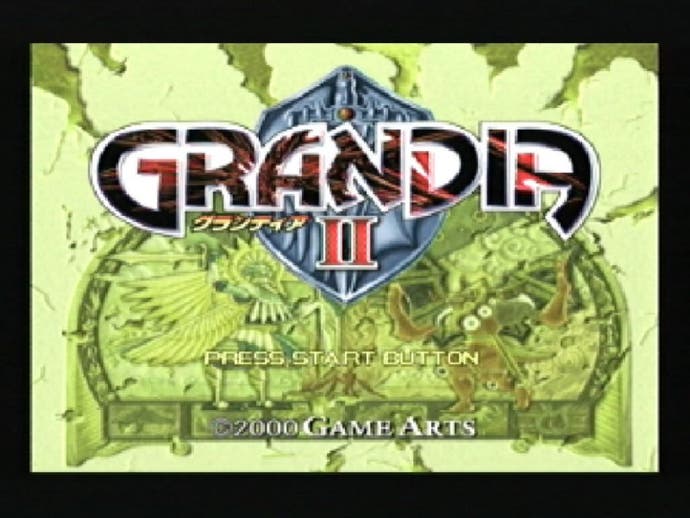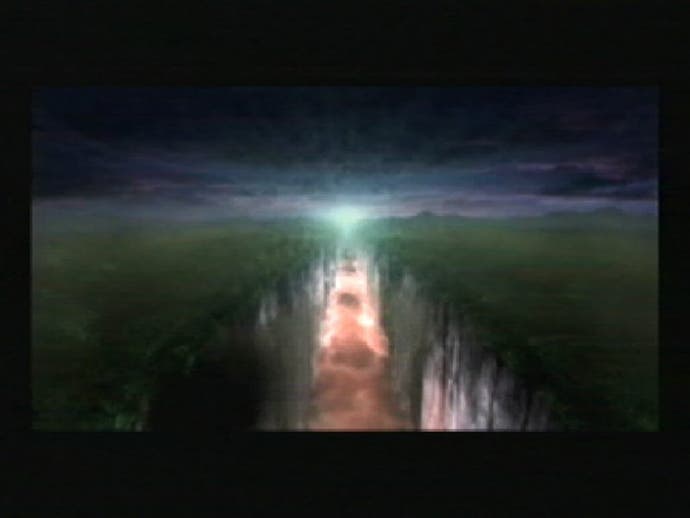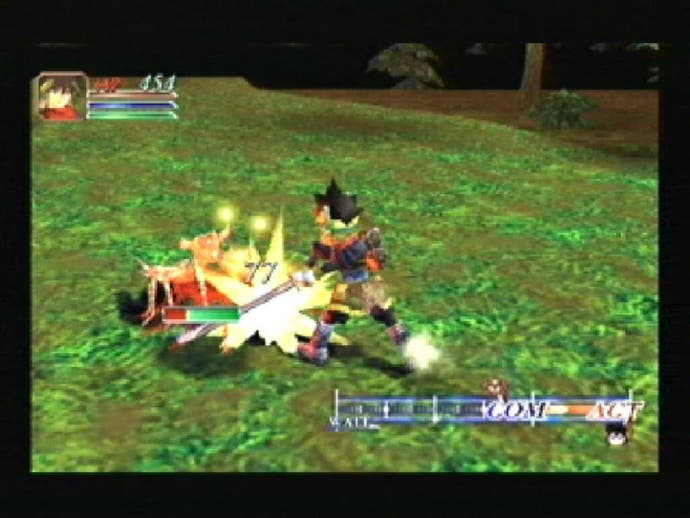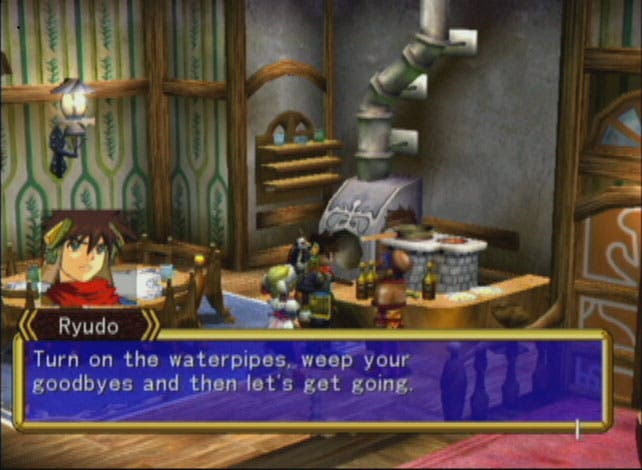Grandia II
Review - the best Dreamcast RPG yet, but is it really?

Good Lord this is a bit good
The original Grandia was released in this country sometime last year on the PlayStation, and it met with a rapturous response from enchanted RPG gamers, who couldn't get enough of it. Of course, owners of Sega's Saturn were utterly distraught by the release. In Japan, the game had been released on the Saturn quite early on, along with other monumentally popular RPGs like Shining Force III and the Saturn's version of Phantasy Star (the online sequel to which Sega are in the process of launching right now), which have never seen translation in any territory outside of Japan. Despite this, the game was still played by many who struggled with shoddily translated texts distributed on the Internet and other guides. It's very hard to play an RPG with quite as much devotion though when every so often you have to hit the next button on Internet Explorer to load up the next page of dialogue. Training yourself not to skip ahead is a challenge unto itself. It's fair to say then, that Dreamcast owners deserve a brilliant sequel to Grandia II, and in our opinion, this is it. However, it is not without flaws, and the flaws are going to make it very difficult for fans of the series that have been lusting after this game for so long to enjoy it. For starters, Grandia II hasn't sold well in Japan. That sets the warning klaxons firing in itself, but upon closer inspection (and certainly for the entire first afternoon of playing it), we had no idea why this could be. The game seemed to precisely what we had hoped for: it features a loveable lead character; it quickly introduces an obvious romantic interest; the dialogue is pretty well founded and occasionally very witty, and the voiceovers while occasionally suffering from incorrect-tone syndrome, are on the whole exceptional. Nonetheless, it dawned on us at about the three-hour mark just why the Japanese hadn't lapped it up.

The story is embarrassingly predictable
This seemed rather improbable, because, when faced with an absolute sure-fire hit from coast-to-coast, one does not employ writers from the old school. That's right, despite years of preparation; Grandia II employs the classic 'collect lots of items until you face the final battle' methodology, and it makes the developers look out of touch with the RPG scene. It's as predictable as this evening's dinner, which I have already purchased. Basically, you control a young GeoHound called Ryudo, and his trusty winged sidekick Skye. A GeoHound is like a modern-day mercenary, who performs murderous tasks for money and shows no remorse. The occupants of the Grandia world generally respect them for fear of the consequences of not doing so, if you catch my drift. Anyway, Ryudo and Skye arrive back at home camp after a few weeks of perilous money-grabbing, and chance upon an interesting proposition from a Priest of the Church of Granas. Granas left several marks on the planet before slinking back into Godly anonymity, most obviously the enormous trench that his mighty wrath dug like an equator when he rid the world of the evil God Valmar. His religious followers pride themselves on goodliness, hence Ryudo's surprise at the remarkable invitation. In the process of performing his duties, he meets a delightful young maiden called Elena, who is promptly swept from his grasp by the evil forces of Valmar, during the ceremony he was paid to escort her to and from. Before long he is caught up in a struggle to free her, and the world's ancient religious origins come back to haunt him. Fanatical Grandia lovers may be disappointed with the story, which is a touch corny and rather obvious, and God only knows what they will make about the linearity. There are a lot of places to go and things to see in Grandia II, but steering off the obvious path is not one of your options. As we said, the translation from Japanese to English is top quality, with some inspirational scripting at times. There aren't many belly-laughs, but there is some mind-bending philosophy to mull over, particularly from Mareg. The Americanised voiceovers one can take or leave, but I found it rather unsatisfactory that only some of the lines were voiced over. Why weren't they all? Why are players forced to scroll through pages of text and only receive voiceovers every once in a while? There's sure as hell a lot of text in the game, but others have managed it…

Moving swiftly on…
Hardcore fans of the series will have rightfully expected something more from the game, but we would defy even them to take issue with the game's refined battle system. First off, random encounters have no place here. If you can avoid the monsters you see crawling and walking around, you can avoid confrontations entirely. Ironically though, thanks to the strength of this area of the game, Grandia II becomes one of the first RPGs I've played in a long time where I wouldn't have objected to random battles. The enemies can be clearly seen moping around the landscape, and with a little camera management can be avoided easily. Of course, there's the odd scripted section where enemies ambush you, but on the whole if you spot one and wait for it to turn away, you can either dash by, or surprise it enough to get the first blow in. The battle system itself switches to the turn-based view, and upon doing so, the player is forced to take several things into account. Firstly, the IP meter, which shows how you, the other members of your party and your enemies are powering up. Once you or they reach the action point, you can select your attack. At this stage, the second and third important factors in each battle come into consideration. How far away is the enemy, and which move would be best, based on the established distance. You see, if you select a Combo move, for example, you will dash up to your enemy and pound him with whichever weapon you happen to have handy, but if you don't get to them before they reach their action stage, the chances are they could quite easily counter your manoeuvre, nullifying it and smacking you about the place a bit in the process. The move they will have employed, incidentally, is known as a Critical. When your enemy selects an action, spell or whatever, if you reach the action phase before they have had time to execute it, you can use a Critical to render their attack useless, providing you can intercept them in time. Doing this can actually lead to you taking no damage at all from certain encounters.

Bash! Thwock! Etc.
The real fun starts when you have multiple party members and multiple assailants. Launching a perfect offensive in conjunction with your colleagues is about as close to utopia as I've been. It's devastatingly effective, and will get your levels up quicker than anything. Other benefits of regular confrontations are the actual rewards. Obviously you gain experience points, something that becomes incredibly important later on in the game, but aside from that, you also collect things like mana eggs, magic and skill coins and skill books. As with Grandia the original, you equip mana eggs to learn magic, but magic coins supplement this by improving the efficiency of your spells and such. Skill coins work in a similar manner, improving character-specific special attacks. Skill books can teach character secondary moves and enhance endurance. In this sense, after a time every battle is an entirely unique experience. The level of customisation you can effect on your party is immeasurable, and so in spite of the linear plotline and disappointing story, replay value is rife. I've played the game pretty much the whole way through twice now, and on both occasions I was able to use different approaches to each situation. Graphically, Grandia II improves where the first left off, too. Originally, Grandia used lush 3D backgrounds with some charming 2D visuals in the foreground, but the sequel is a truly three-dimensional experience, as demonstrated by the way you control the camera with the shoulder buttons. Sidling around towns and other areas is simply breathtaking - not only are your characters' movements fluidic and beautifully animated, but the surrounding ebb and flow with your every move. Although it's a pretty predictable universe, it's a tremendously elegant one. We would put it on a par with some of the Final Fantasy games, and it has a soundtrack to match, too. Perhaps it will even give some people cause to show a little jealousy. Namely PlayStation fans who stuck their noses up at the DC thanks to its poor showing of Western RPGs.
Conclusion
At the moment, Grandia II is the best RPG available on the Dreamcast in Europe, and we strongly recommend you play it. Yet for all its strengths, we can't shake the conviction that the fact that every quality lies behind a twisted, yet predictable storyline will make the game inaccessible to most RPG-heads. Grandia II is an incredibly tough game to call - we hope it prospers enough for Game Arts to see their way through to a sequel, but if it flops in the West, it will be obvious why.

